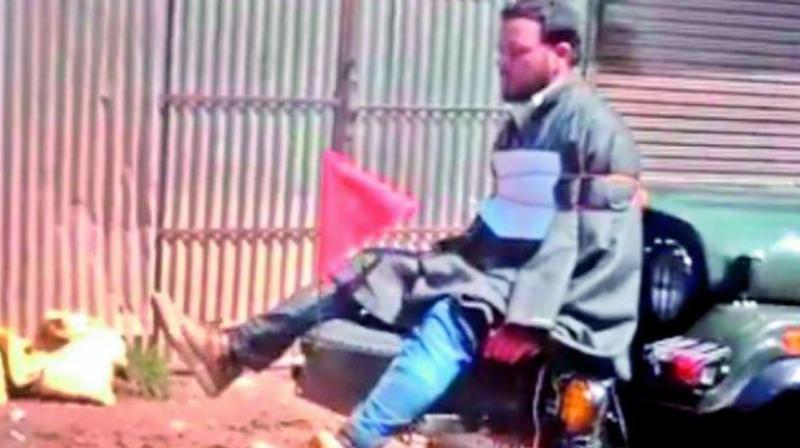DC Debate: The way to fight a dirty war?

A violation of basic human rights: M. Ashraf, The writer is a former IAS officer who last served in J&K as director-general of tourism
There should be absolutely no doubt in anyone’s mind that tying Farooq Ahmed Dar, a shawl weaver from a village in Kashmir’s Budgam, to the fender of a Rakshak jeep to use him as a human shield and parade him through villages to “deter stone-pelters” has damaged the Indian Army’s image. The nastiest was when Army Chief Gen. Bipin Rawat not only defended the act, which had triggered outrage in Kashmir and beyond, but also chose to honour Maj. Nitin Leetul Gogoi, the officer who was in the eye of a storm over the episode and facing a court of inquiry ordered by the Army itself, with his “commendation card”. For some critics, the image, in a way, refreshed the brutalities committed by the American Army on civilians in the Vietnam War. Kenneth Roth, executive director of Human Rights Watch, tweeted, “Indian Army Chief shows criminal leadership, backing as ‘innovative’ troops’ use of Kashmir man as a human shield.”
At home, a number of very senior retired officers of the Army also decried the use of human shield. In fact, one of them, Lt. Gen. H.S. Panag, who has served in Kashmir, went to the extent of saying: “This image will end up being the defining image of the Indian Army, just like the Napalm girl was for the Vietnam War.” And when Maj. Gogoi was honoured, Lt. Gen. Panag had to say: “IA traditions, ethos, rules & regs swept away by the ‘mood of the nation’! I stand by my views even if I am the last man standing!”
However, these things usually happen only in a war and in enemy territory. When it comes to Jammu and Kashmir, the security forces are faced here with “limited terrorist actions” and not really full-fledged armed conflict in the state. Yet the Army is being used against own citizens. No one uses one’s own citizens in one’s own country as a protective shield, no matter how grave the provocation is!
Tying an innocent man in front of a jeep and parading him through 30 villages or so to instil fear among the population is preposterous. As it turns out, Dar, had nothing to do with stone-pelting or any protests. The Army is supposedly fighting a war against its own people. Such an attitude is not going to improve the situation, but worsen it further and in turn damaged its own image further.
This was an out-of-the-box thought: Tajinder Bagga, The writer is a Delhi BJP spokesperson
The Indian Army is one of the finest and most-disciplined armed forces of the world. The prime objective of the Indian Army is to secure the nation and maintain law and order whenever called for. And for fulfiling these two objectives, the Indian Army in particular and security forces in general, have the right to do whatever they deem fit in greater interest of national security. In the case of Maj. Nitin Leetul Gogoi, which is being discussed, some people are crying “Army did this” and “Army did that”, but the real question is what did they do that forced the Army to come in the first place?
The Army unit in question went to Budgam not to do any counter-terror operation but in response to an SOS call given by a small Indo-Tibetan Border Police unit stationed there, who had informed Maj. Gogoi that around 1,200 people had cornered a polling booth and were trying not just to burn down the booth in Budgam but were posing a serious threat to the lives of the electoral officers present there, as well as the heavily-outnumbered ITBP unit. Being at the receiving end of stones thrown relentlessly is not a joke. A stone thrown with precision can even kill a human being instantly. Even when Maj. Gogoi’s unit reached the spot, his unit too was heavily outnumbered by a thousand-plus brainwashed, radicalised stone-pelting mob. There were only two outcomes in such a situation: either the mob would have pelted stones and killed the soldiers, or the soldiers would have resorted to firing in self-defence, resulting in heavy casualties among stone-pelting Kashmiris. Under the given circumstances, this was an out-of-the-box thought and a perfect solution.
All those talking about human rights violations and questioning the integrity of the Indian Army should come out and stand in front of 1,200 stone-pelters and suggest what they would have done when the alternatives were either to shoot relentlessly in self-defence or get stoned to death. They should also remember how separatists and stone-pelters are dealt with in other countries by peeping into Turkey, China and even Pakistan. The nation is in need of thousands of Maj. Gogois. We should also thank Prime Minister Narendra Modi for ensuring a free hand to the Army and conveying this clear message to all concerned that the government stands tall with the Army.

